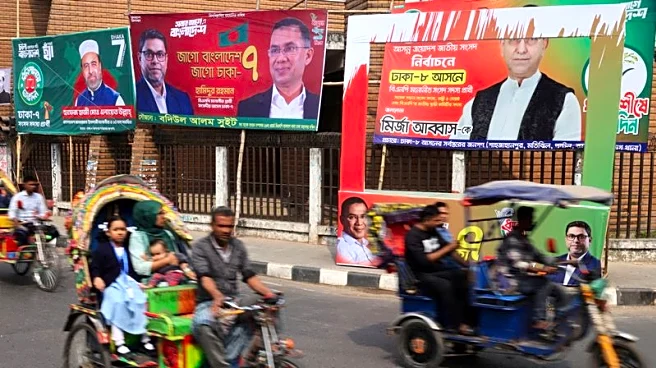What's Happening?
Filmmaker Bing Liu, known for his Oscar-nominated documentary 'Minding the Gap,' has ventured into fiction with his latest film 'Preparation for the Next Life.' The film, based on Atticus Lish's 2014 novel, follows the unlikely romance between Aishe, an undocumented immigrant from China's Uyghur minority, and Skinner, a white Army veteran suffering from PTSD. Set in New York City, the narrative delves into their struggles and the societal challenges they face, highlighting themes of mental health and the exploitation of undocumented individuals. The film is noted for its character-driven approach, focusing on the human experiences and interactions that shape their relationship.
Why It's Important?
The film 'Preparation for the Next Life' addresses significant social issues such as mental health among veterans and the plight of undocumented immigrants in the U.S. By portraying these themes through a personal love story, the film offers a nuanced perspective on the challenges faced by marginalized groups. It sheds light on the emotional and psychological impacts of these issues, potentially influencing public discourse and policy regarding immigration and veteran affairs. The film's exploration of these topics may resonate with audiences, fostering empathy and understanding for those affected by such circumstances.
What's Next?
As 'Preparation for the Next Life' gains attention, it may spark discussions on the representation of immigrant and veteran experiences in media. The film could lead to increased awareness and advocacy for policy changes that address the needs of these communities. Additionally, Bing Liu's transition from documentary to fiction may open new avenues for storytelling that blend factual and narrative elements, potentially influencing future cinematic projects.
Beyond the Headlines
The film's portrayal of the Uyghur minority and their struggles adds a layer of cultural significance, highlighting the global issue of ethnic persecution. It also raises ethical questions about the portrayal of marginalized groups in media and the responsibility of filmmakers to accurately represent their stories. The film's focus on personal resilience and adaptation in the face of adversity may inspire broader conversations about identity and belonging in contemporary society.










